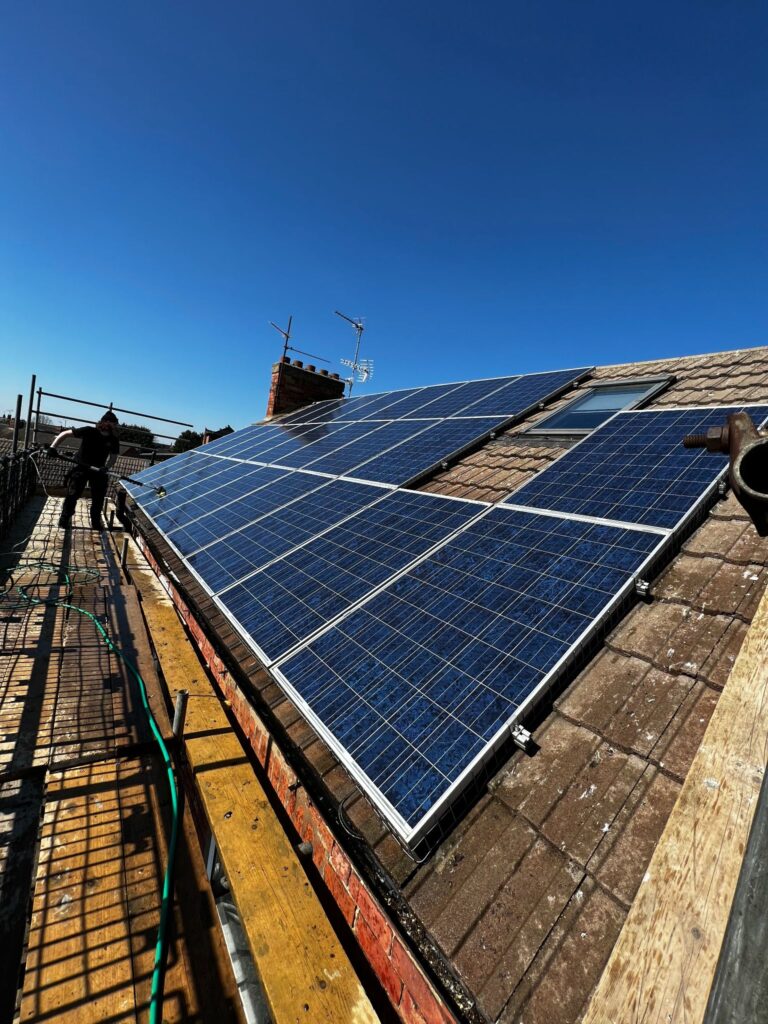Solar Installation
Speak to our team today for a FREE quote!
[email protected] | Call Us Now: 01527 336 386
THINKING OF GOING SOLAR?
Are you considering a sustainable and cost-effective way to power your home? Solar panels could be the answer you’ve been looking for. With the growing focus on clean energy and a desire to reduce our carbon footprint, solar panels have become an increasingly popular choice for homeowners.
If you’re thinking about installing solar panels, you’re on the right track to a brighter, greener future. Here, we’ll explore why solar panels are an excellent investment for your home, how they work, and the benefits they can bring to your life and the environment.
All our work is done along side our partners at JW Services.

Eco-Friendly Power: Solar panels harness the energy of the sun, a virtually unlimited and clean source of power. By choosing solar, you’ll reduce your reliance on fossil fuels, decrease carbon emissions, and play a vital role in combating climate change.
Savings on Energy Bills: Solar panels can significantly lower your electricity bills. By generating your electricity, you’ll become less dependent on traditional energy sources, and in some cases, you can even sell excess power back to the grid, earning you credits.
Return on Investment: Installing solar panels is an investment that pays off over time. Not only will you save on energy costs, but you’ll also increase the resale value of your home. Many governments also offer incentives and tax credits to reduce the upfront costs of solar installation.
Energy Independence: With solar panels, you gain more control over your energy supply. You’re less affected by power outages and price fluctuations, providing peace of mind in uncertain times.
Solar panels work through a simple yet highly effective process:
Absorption of Sunlight: Solar panels are made up of photovoltaic cells that absorb sunlight.
Conversion to Electricity: When sunlight hits these cells, it triggers a chemical reaction that generates direct current (DC) electricity.
Inverter Conversion: An inverter then converts DC electricity into alternating current (AC), which your home uses.
Power Your Home: The converted electricity powers your appliances and lights, with any excess being sent to the grid or stored in batteries.
If you’re considering installing solar panels, you’re not just making a wise financial decision; you’re also contributing to a more sustainable, eco-friendly future. Solar panels offer an array of benefits, from saving you money to reducing your environmental impact. Make the switch to solar power today and start enjoying the many advantages it offers for your home and the planet. Get in touch with us to learn more about how solar panels can benefit you and your community.
The process of installing solar panels involves several steps, from the initial survey to the completion of the solar energy system. Here’s an overview of how the installation process typically works:
Initial Consultation and Survey:
The process begins with an initial consultation with us. During this meeting, you’ll discuss your energy needs, goals, and budget.
A site survey will be conducted to assess your property’s suitability for solar panels. Factors such as roof condition, orientation, shading, and available space will be evaluated.
System Design and Proposal:
Using the information gathered during the survey, we will design a customized solar energy system that meets your specific needs.
We will provide you with a detailed proposal, outlining the system’s specifications, expected energy production, and a cost estimate. This proposal will also include information about available incentives and financing options.
Permitting and Documentation:
We will assist you in obtaining the necessary permits and approvals from local authorities and utility companies. This may include building permits and interconnection agreements with the grid.
Equipment Procurement:
Once the necessary approvals are in place, we will order the solar panels, inverters, mounting hardware, and other components needed for the system.
Installation of Solar Panels:
The installation team will arrive at your property on the scheduled installation day. They will install the mounting hardware on your roof or other chosen location.
Solar panels will be securely attached to the mounting system, and the wiring and electrical components will be connected.
Inverters, which convert the DC electricity generated by the solar panels into usable AC electricity, will be installed.
Electrical Connection:
The wiring will be connected to your home’s electrical system. This includes installing a bi-directional meter that tracks the energy generated by your solar panels and the energy you consume from the grid.
Inspection and Approval:
We inspect the installation and ensure that it meets safety and code requirements, signing it off once thoroughly checked over.
Once the system passes inspection, it will be approved for operation.
Testing and Commissioning:
The solar installation team will test the system to ensure that it is functioning correctly. This includes checking the electrical connections, inverters, and monitoring systems.
You will be given a demonstration of how to operate and monitor your solar energy system.
Monitoring and Maintenance:
After installation, your solar system will require minimal maintenance. Regular monitoring can help ensure optimal performance. Many systems come with online monitoring tools to track energy production.
If any issues arise, we can provide maintenance and support.
Connection to the Grid (if applicable):
If your system is grid-tied, it will be connected to the utility grid. This allows you to export excess energy to the grid and receive credits for it.
Enjoy Clean, Renewable Energy:
Once the solar panels are operational, you can start enjoying the benefits of clean, renewable energy. Your energy bills will be reduced, and you’ll be contributing to a more sustainable future.
The entire process from the initial consultation to a fully operational solar energy system typically takes a few weeks to a few months, depending on factors such as the complexity of the installation and the local permitting process.
